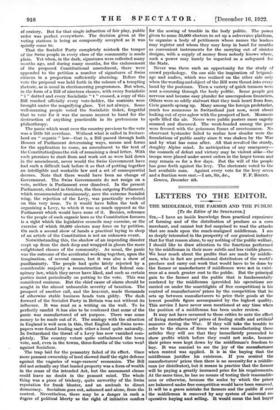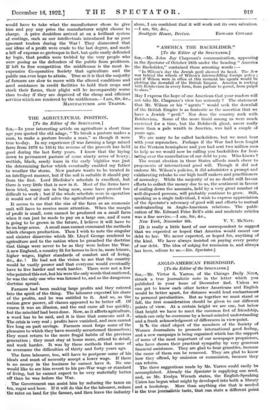LETTERS TO THE EDITOR.
THE MIDDLEMAN, TFIE FARMER AND THE PUBLIC [To the Editor of the SpEc-rsfroa.] Sra,—I have an inside knowledge from practical experience of farming and of the distribution of produce as a corn merchant, and cannot but feel surprised to read the attacks that are made upon the much-maligned middleman. I am so deeply interested in the prosperity of our greatest industry that for that reason alone, to say nothing of the public welfare, I should like to draw attention to the functions performed by the middleman in their more subtle and less visible phases. We hear much about the profits that are made by middle- men, who in fact are professional distributors of the world's produce and carry out work that would have to be done by the farmer or manufacturer if middlemen were not in exist- ence at a much greater cost to the public. But the principal gain to the farmer and the public that is fundamentally rendered by the middleman (provided his operations are carried on under the searchlights of free competition) is his control of manufacturers' prices by the competition that he sets up between manufacturers to price their goods at the lowest possible figure accompanied by the highest quality. This service I have never seen mentioned at any time when the position of a middleman has been under review.
It may not have occurred to these critics to note the effect of fixing manufacturers' prices of feeding stuffs and artificial manures during the War. If they will take the trouble to refer to the shares of firms who were manufacturing these articles they will see that they immediately proceeded to show profits which before they could not make, because their prices were kept down by the middleman's freedom to buy. It was comical to see the joy of the manufacturer when control was applied. It is in the buying that the middleman justifies his existence. If you control the manufacturers' prices then there is no necessity for a middle- man (or distributor), but it means in practice that the farmer will be paying a greatly increased price for his requirements. At the same time, he has no means of testing their reasonable- ness or otherwise, because the scales by which the prices are balanced under free competition would have been removed. It will be a grave mistake for farmers and the public if ever the middleman is removed by any system of universal co- operative buying and selling. It would mean the last buyer
would have to take what the manufacturer chose to give him and pay any price the manufacturer might choose to charge. A price doubtless arrived at on a brilliant system of coatings, such as our intellectuals introduced for us poor ignorant traders during the War ! They discovered that our ideas of a profit were crude to the last degree, and made a bill of expense so grotesque in fact, but quite easily defended by logic, that profits were trebled by the very people who were posing as the defenders of the public from profiteers. If left to free competition the middleman is the most in- expensive Co-operative Society that agriculture and the public can ever hope to attain. True as it is that the majority of farmers are slow to move with the altered conditions and need assistance in credit facilities to hold their crops and stock their farms, their plight will be incomparably worse than to-day if they are deprived of the cheap and efficient services which are rendered by the middleman.—I am, Sir, &c., MANUFACTURER AND TRADER.















































 Previous page
Previous page